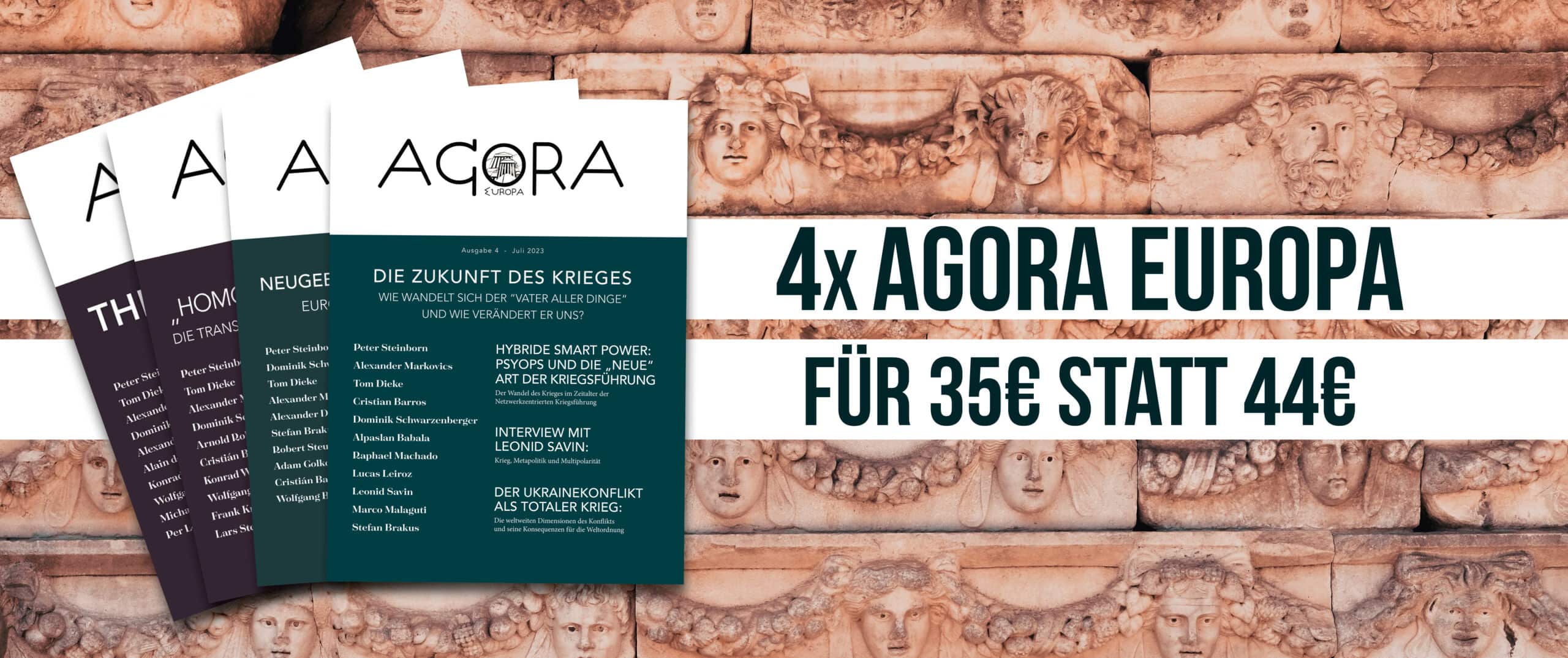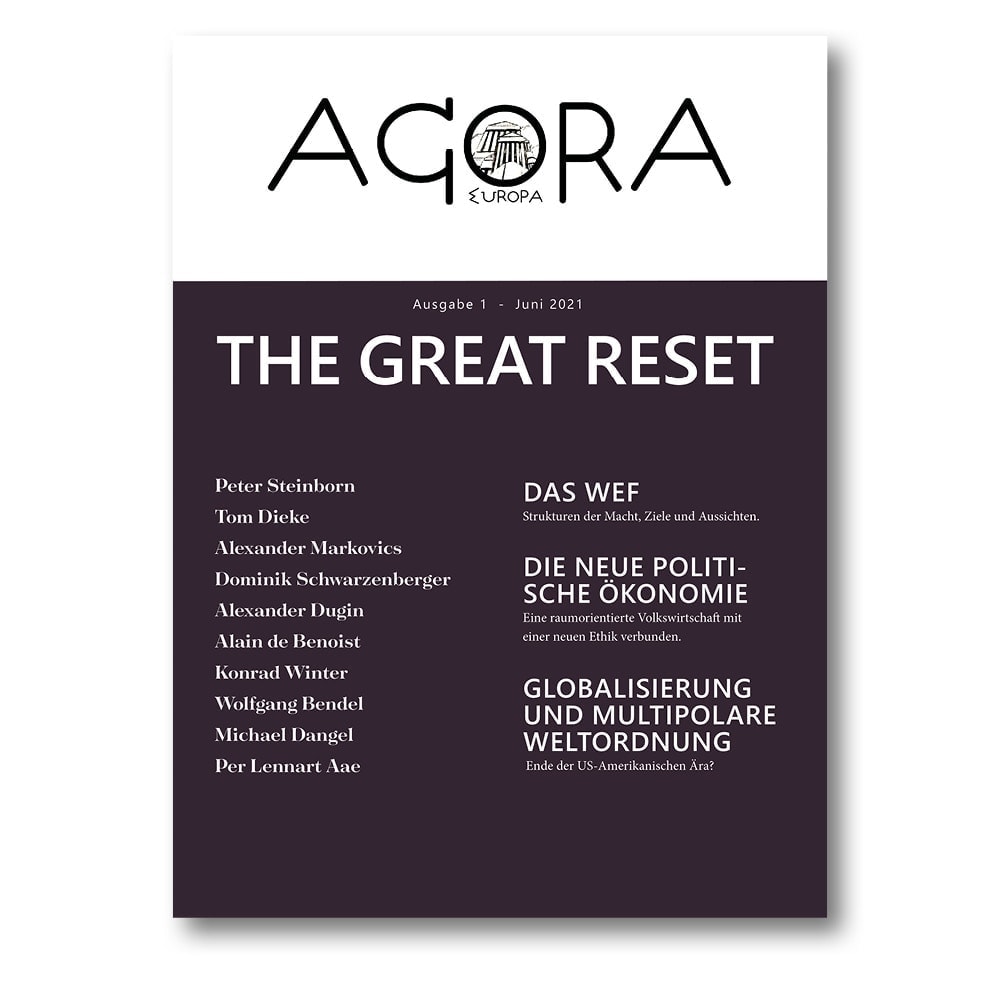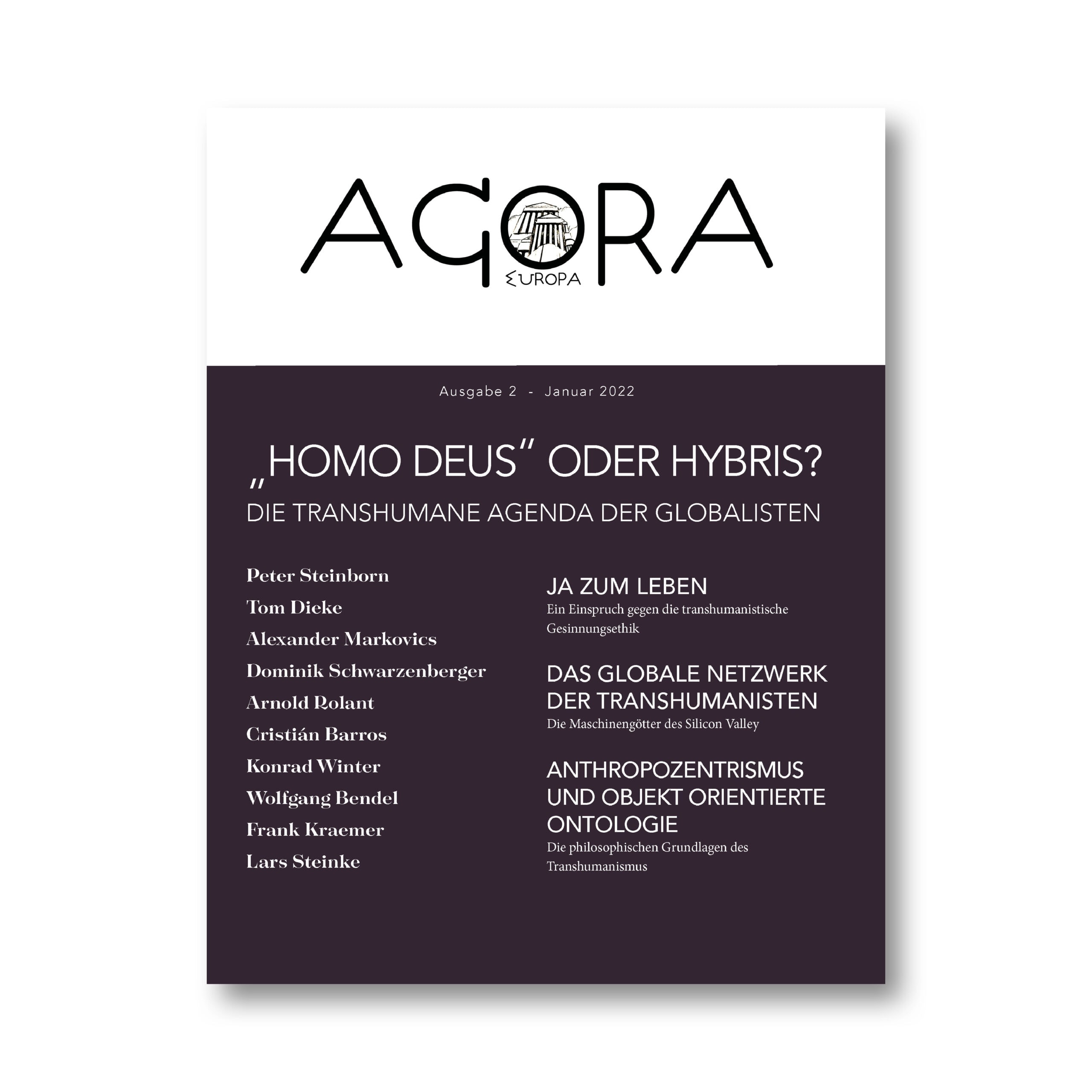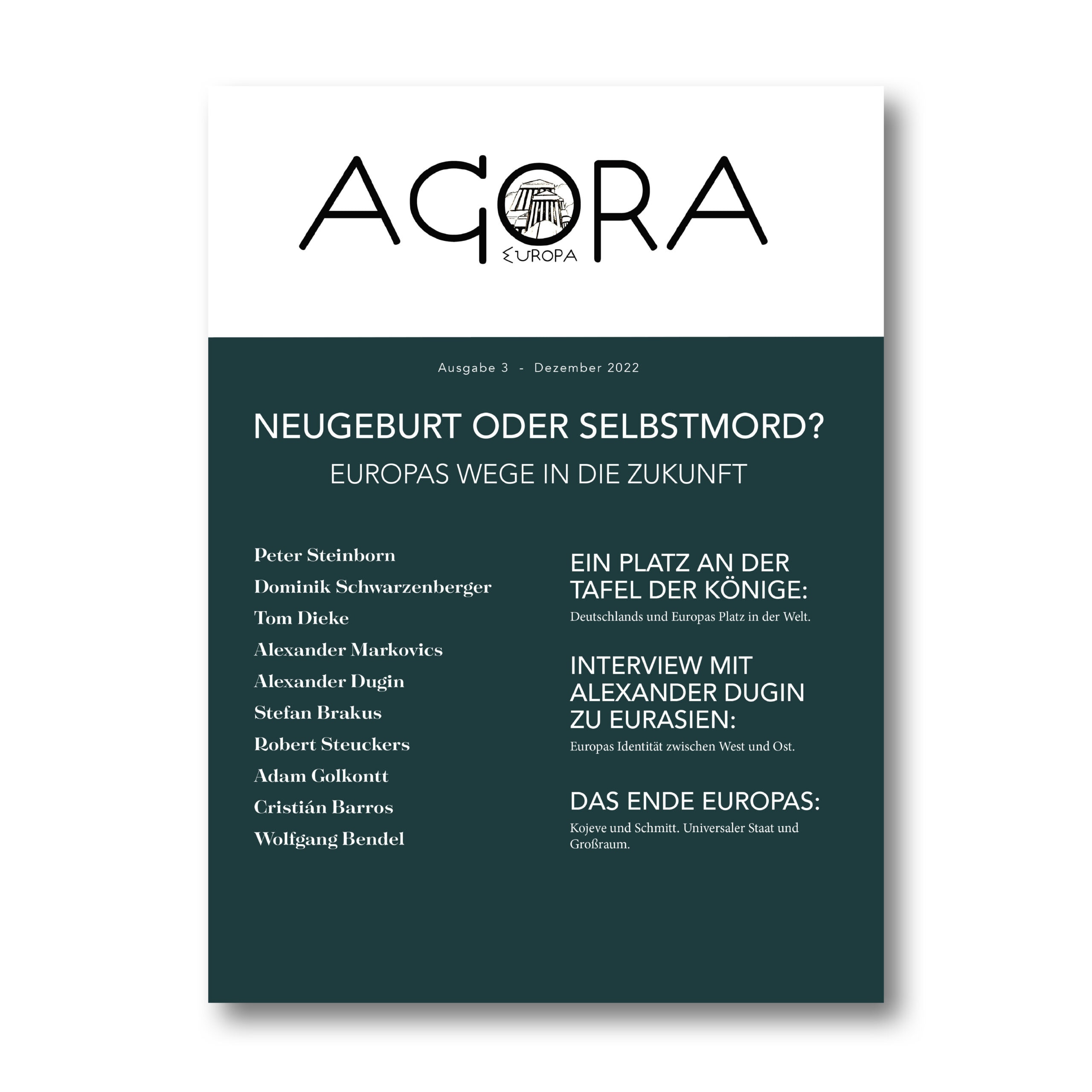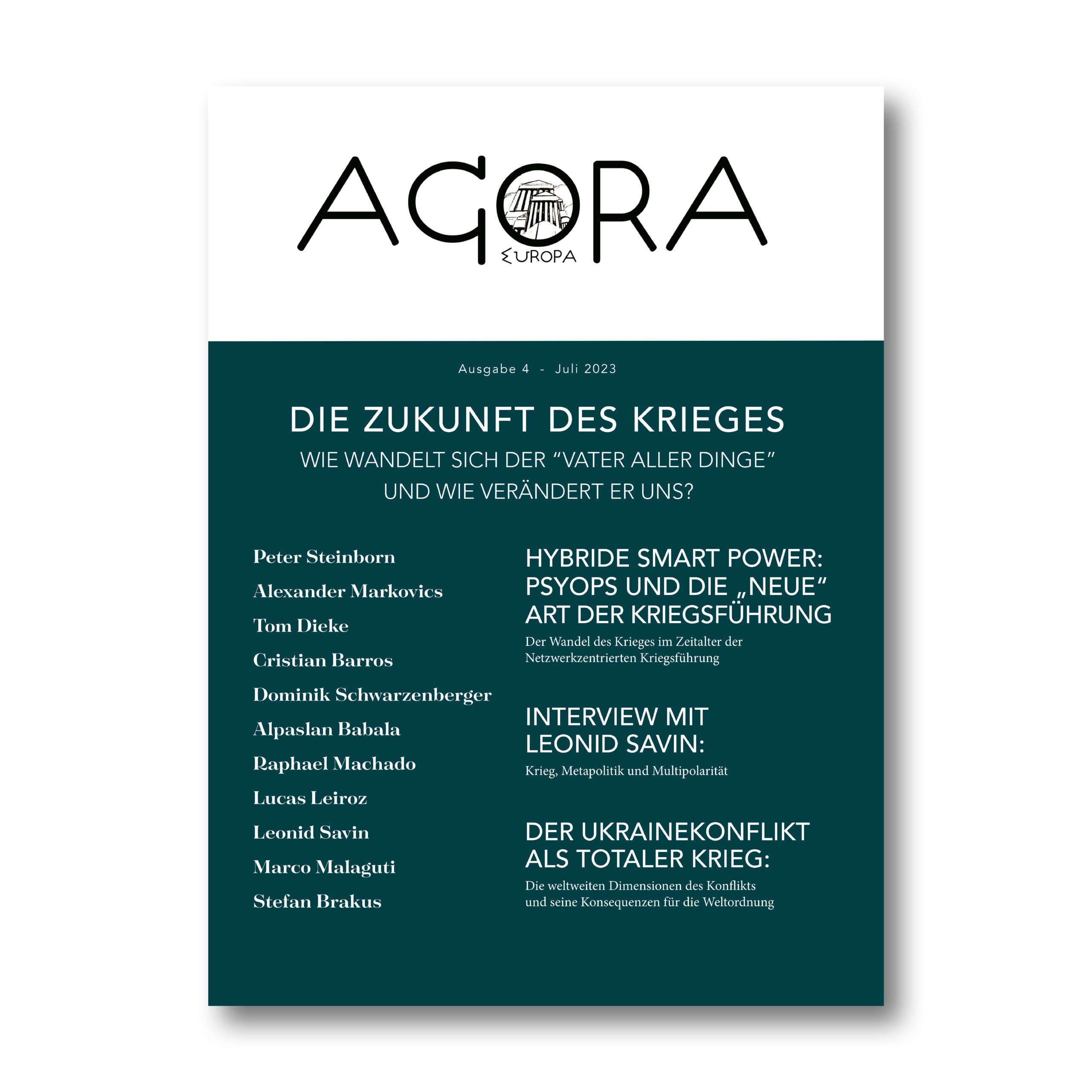
AGORA EUROPA
The magazine for right-wing metapolitics
The lack of ideas on the German and European right was one of the main reasons for founding MetaPol. For many years we have observed how right-wingers talk about "revolution" without addressing their underlying political theory. We have seen how the globalist system is criticized without addressing the political economy, and we have seen how often well-intentioned activism goes aimlessly nowhere and loses its actors or leads them to conform. The right still lacks a positive reference to its own - the creative and open shaping of discourse and the formulation of future-oriented political ideas.
The concept
With AGORA EUROPA , our publishing house, under the editorial chairmanship of Alexander Markovics, brings out the journal for right-wing metapolitics in the German-speaking world. Like its ancient namesake, we not only want to contribute to the gathering of like-minded spirits, but also to the development of a common identity.
AGORA EUROPA fills a gap in the German print landscape. It provides the reader not just with a loose collection of texts, but with a self-contained, multi-layered body of work. Open, diverse, factual, but also tough and controversial. In four chapters, the magazine takes its readers on a journey along the coordinates of a goal-oriented discourse. The end result is a sharpened profile and thus the promotion of a real right. All chapters are based on the guiding theme, which also forms the title of the issue.
Die Agoge macht den Anfang. Hier werden im Sinne der Weltanschauung, Philosophie und Tradition der Echten Rechten Impulse gesetzt.
Der Weitblick beschäftigt sich mit den Entwicklungen in der Geopolitik, dem Kampf zwischen der Zivilisation des Meeres und der Zivilisation des Landes und den sich daraus ergebenden Spannungen. Hiermit richten wir den Blick weit über den Tellerrand hinaus.
In the Ekklesia , on the other hand, there is an exchange of opinions. Representatives of opposing viewpoints will have their say here in a tough but fair manner in order to facilitate an open debate and substantive discussion.
The category On the Matter offers science and theory on a purely objective basis. Here we claim to present scientific texts and theories from the perspective of the far right. We want to provide impulses and draw attention to important topics in basic texts.
The conclusion, which is written by the editorial team as a whole and summarizes the content, forms the conclusion of each issue. Each issue will therefore represent a thematically self-contained whole. Our aim is to initiate a new culture of debate within the Right and to establish a genuine Right that returns to its traditions. Our offer is aimed at right-wingers of all currents who are interested in theory; intellectuals, academics and thinkers, which of course also includes the adepts of the true (New) Right.
With this in mind, we wish you an enjoyable and stimulating read and encourage you to take part in the exchange on our platform!
Are you a new AGORA EUROPA customer?
Then order all issues of our Agora Europa at the special price of 35€ instead of 44€, including shipping costs.
The package contains the following issues:
-THE GREAT RESET 2021
-HOMO DEUS OR HYBRIS 2022
-REBIRTH OR SUICIDE 2022
-THE FUTURE OF WAR 2023
Agora Europa – The Great Reset
10,00 €
The first issue of AGORA EUROPA deals with the Great Reset proclaimed by the global elites at the World Economic Forum. In addition to the actors and their world view, it looks in particular at the diverse possibilities for action of the far right against the backdrop of geopolitical, economic and social shifts. In the end, it becomes clear that the current conditions for the far right are much more favorable than often assumed.
Authors: Alexander Markovics, Peter Steinborn, Alain de Benoist, Alexander Dugin, Wolfgang Bendel, Per Lennart Aae, Dominik Schwarzenberger, Tom Dieke, Michael Dangel, Konrad Winter.
Agora Europa – „Homo Deus“ or Hybris?
10,00 €
The title "Homo Deus or Hubris? The Transhuman Agenda of the Globalists" contains a who's who of the global transhumanist scene. Furthermore, the authors outline the historical development and point out the ideological roots of transhumanism. In Ekklesia, right-wingers of various stripes discuss how much transhumanism there is in today's right. In this issue, however, the editors draw clear boundaries and once again take a different, far more optimistic view of the current situation.
Authors: Alexander Markovics, Peter Steinborn, Lars Steinke, Alexander Dugin, Cristian Barros, Wolfgang Bendel, Arnold Rolant, Dominik Schwarzenberger, Tom Dieke, Frank Kraemer, Konrad Winter.
Agora Europe - Rebirth or suicide?
12,00 €
Rebirth or suicide? Europe's paths into the future
This is the title of the third issue of our magazine for right-wing metapolitics. After dealing with the “Great Reset” and the transhumanist ideas of the elites, this issue continues with key geopolitical issues. The authors deal with the all-important question “Quo vadis, Europe?” and shed light on the ideological and geopolitical possibilities of this “Eurasian tip” (Peter Steinborn).
Right at the beginning, Peter Steinborn outlines Europe's place in the world and Germany's place in Europe in the two-part editorial “A place at the table of kings”. In doing so, our author proves himself to be a visionary who is not afraid to openly name the dark sides of the continent, but at the same time sees Germany in particular as one of the most important players on the Eurasian chessboard. The controversial Russian philosopher Alexander Dugin, who has always been known for his different point of view, offers an outstanding and unique interview. Er zeichnet dem Leser die Widersprüchlichkeit zwischen Land- und der Meeresmacht, wobei er ihn tief in die russische Geopolitik hineinblicken lässt. Meanwhile, Cristián Barros, a professor at the University of Development in Chile, points the reader towards the philosophical foundations from Carl Schmitt to Alexandre Kojeve, leaving the old Europe to die, but not preventing a new birth.
Those who know us know that we always shed light on different perspectives, which is why we also present geopolitical ideas that are independent of Russia and the USA. In Ekklesia, our authors discuss the future forms of government and state in Europe and the reader also gains an insight into other national perspectives on geopolitics. For example, the reader is presented with an opposing position to Russia, which revives the old idea of the Intermarium. Furthermore, sober analyses and possibilities for a new constellation are presented, in which a “Europe of spaces” is seen as realistic in the future.
So anyone expecting one-sided literature in a bipolar geopolitical conception in this issue is likely to be disappointed. Neither Russia nor the USA, neither East nor West, but Europe, Eurasia and the world are the dimensions in which our authors think, even if they may adopt different perspectives. The question is therefore not which master Europe should serve, but how it can secure its place at the table of kings.
In this issue, the reader is presented with geopolitical fundamentals relating to Eurasia, Europe and the most important entities therein. Other authors of this issue are Alexander Markovics, Dominik Schwarzenberger, Tom Dieke, Stefan Brakus, Robert Streuckers, Adam Golkontt and Wolfgang Bendel.
Agora Europe - The future of war
12,00 €
As in the past, it is important to us in this issue not only to reflect current events, but also to use them as an opportunity to recognize our own position in the midst of political tensions and to lead the European Right on the right path.
With this in mind, the fourth Agora deals with the central topic of modern warfare, increasingly taking into account the incipient multipolarization of the world order. This was prompted by the current conflict in Ukraine and its consequences. The unipolar moment that has existed up to now is coming to an end and being replaced by a multipolar one, in which new global players are asserting themselves and finding their way into their new roles.
At the beginning, Agora provides the reader with a basic overview of modern warfare (even if not quite as modern as expected) and stratagem, revealing the position and convictions of Europeans in this area. Hybrid warfare, the technical developments of recent decades and the influence of media reporting are also discussed, with the latter being a highly topical issue, especially with regard to Ukraine. Our authors provide background information and their contributions encourage us to explore new ways to emerge from the political conflicts as a sovereign Europe and to survive in the new world order.

